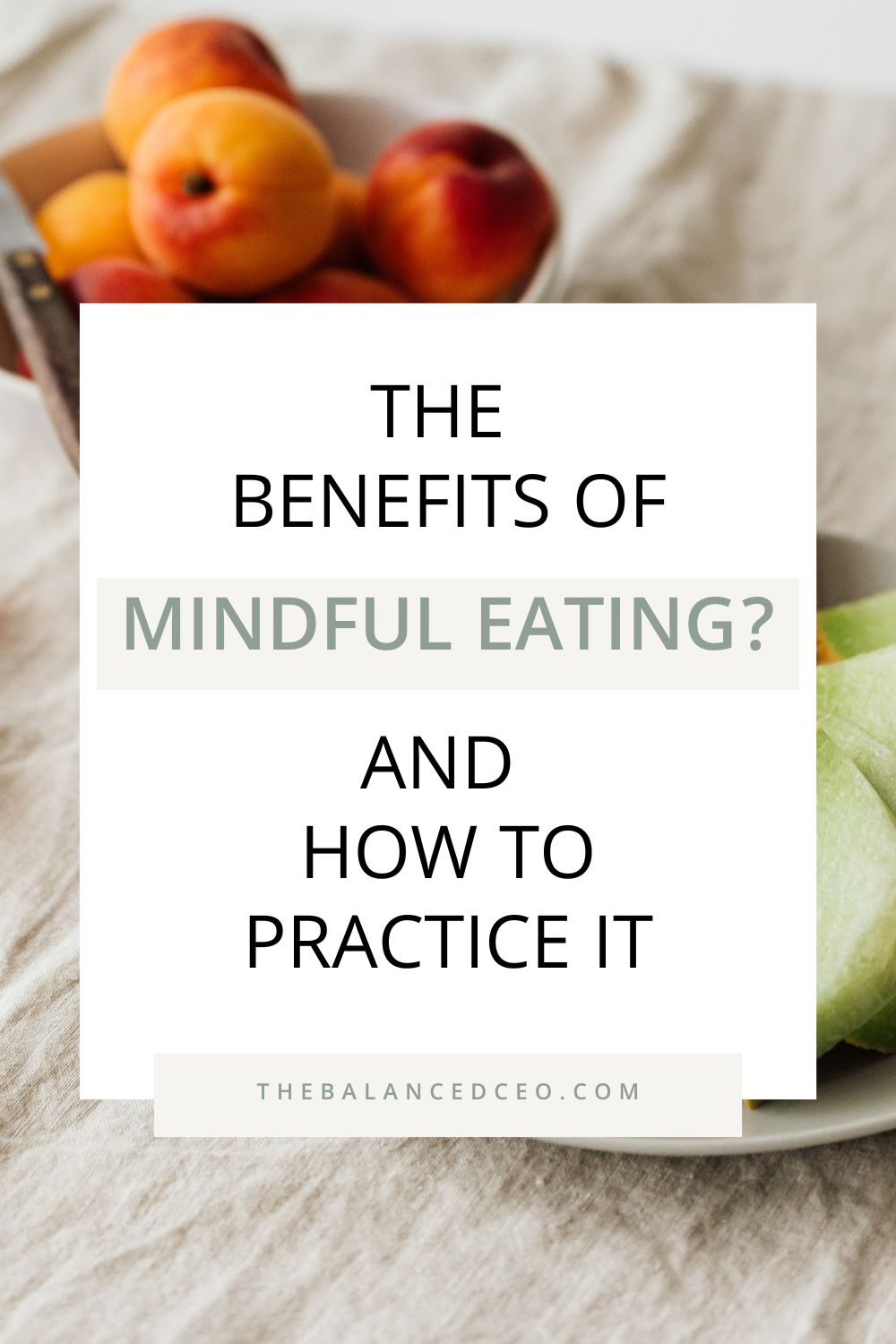This post may contain affiliate links, which means I’ll receive a commission if you purchase through my links, at no extra cost to you. Please read full disclosure for more information.

Have you ever sat in front of your TV to eat dinner, and before you knew it, all your food was gone? Eating can sometimes become a mindless activity you do as a routine, a coping mechanism or even while distracted by something else. It’s vital to gain control so you can combat those behaviors. Mindful eating is a healthy way to enjoy and tune into the foods you love.
What Is Mindful Eating?
Mindful eating is paying attention to every detail of your food and focusing on the sensations. It is easy to rush through meals on a busy day or get lost in your favorite snack while distracted. Eating mindfully controls your food intake and lets you savor the experience.
Mindfulness is different from a diet. Diets are more rule-oriented, with specifics on what to eat and how much. When eating mindfully, you focus on appreciating the moment while staying tuned in to hunger levels, textures, tastes and other sensations. It allows you to enjoy the foods you eat and understand the amount your body is asking for.
While diets target physical health benefits, mindful eating is related more to mental health and wellness. Eating disorders are often tied to mental health conditions, like anxiety and depression. By taking time to appreciate the process of eating, you can begin to heal any trauma you have associated with food.
Mindful eating typically leads to people eating less food, going slower, and selecting items with higher nutritional value. In today’s fast-paced society and with countless food choices, taking back control can benefit you in many ways. Here are five benefits of mindful eating.
The Benefits of Mindful Eating
1. Weight Loss
One of the main concepts of mindful eating is tuning into your body’s sensations. This includes the feeling of being full. Mindful eating helps you stop when you’ve had enough. It’s too easy to overeat if faced with many distractions. Tuning into how full you feel while enjoying your meal or snack can regulate your body weight and promote weight loss.
2. Reduced Overeating and Binging
Mindfulness provides the mindset to help people pause and check in with themselves. This can break the cycle of binging and overeating. This strategy can help you develop a better relationship with food.
Binge eating is characterized as consuming large quantities of food within a short period until you feel full to the point of discomfort. People often feel a lack of control during these moments. Mindfulness-based interventions (MBI) are increasingly popular for eating disorders. Twenty studies involving 21 samples showed MBIs significantly decreased binge eating severity and depression and improved emotional regulation.
3. Improved Self Image
In today’s world, we put a lot of value on physical appearance and fitness. Regardless of what the scale reads, everyone can experience body dysmorphia or general self-consciousness about their weight.
Food and weight can take a serious toll on our mental health. You might find yourself skipping meals, despite the empty feeling in your stomach. On the other hand, you may indulge in stress eating, followed by guilt. Finding mindfulness in the eating process can be a way to unpack the emotions you have with food – and break down the negativity associated with nourishing your body.
Related Read:
• How to Be Mindful Throughout the Day
4. Healthier Food Choices
When you become more aware of how food makes you feel, you may start reaching for healthier choices. You can determine what makes you feel good and energized compared to what makes you tired and sluggish. Be sure to focus on foods that help you feel better throughout your day.
5. Satisfaction From Eating
Paying attention to the foods you are eating lets you fully enjoy the flavors, textures and more. When indulging in a treat like cake, a couple of bites can do the trick rather than a big slice. You realize that you will have the chance to have some again later instead of eating the whole plate and feeling guilty.
By focusing on satisfaction, you can begin to reject the harmful effects of diet culture and body shaming. Listen to what your body needs, rather than what other people have to say about your body’s appearance.
How to Practice Mindful Eating
Practicing mindful eating can be as simple as putting away distractions and taking your time while enjoying a meal. Here are some ways you can start today.
1. Take Lunch Breaks
How often do you find yourself working while you eat lunch? Or worse, skipping lunch altogether because you think you don’t have time? In reality, studies show that taking a break during the workday makes people more productive and relieves stress. Instead of mindlessly snacking while you send emails, step away from your desk and eat a full, nutritious meal. When you take the time to savor your food, you’ll be more energized to continue your day.
2. Turn Off the TV
It might be tempting to turn on the TV when you sit down for dinner at night, but try to avoid it. Challenge yourself to sit and eat without distraction. If you really don’t like the silence, try playing calming music or nature sounds in the background. Pay attention to each bite, rather than focusing on the TV.
3. Cook Your Food
Some days, you might feel too busy or too tired to cook a meal, so you order takeout or eat whatever leftovers you can find. While it’s not always possible to cook all of your meals, there are benefits in doing so when you can. The end product, your meal, will feel like an accomplishment that you can be proud of. You’ll appreciate your food more after going through the steps to make it.
4. Eat Together
Mindful eating doesn’t need to be a solitary activity. Meals are a great time to socialize and bond with others. Having a meal with family or friends can be much more satisfying than eating by yourself.
Try Mindful Eating
Mindful eating can complement any eating pattern. Adding behavioral strategies can lead to a better relationship with food and a feeling of being more fulfilled.

Cora Gold
Contributor
Cora Gold is the Editor-in-Chief of Revivalist magazine, a publication dedicated to happy, healthy, and mindful living.





Leave a Reply